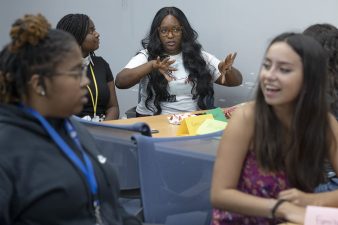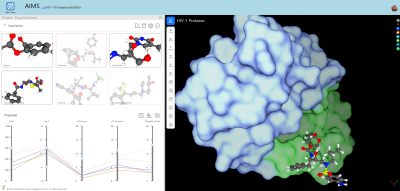CBESS: a pipeline program to increase linguistic and geographic diversity in STEM + health
-
Project Description
This SEPA project aims to provide underrepresented bilingual students with the opportunity to take part in a 17-month education program with a culturally relevant pedagogy and STEM plus health content to support students’ pathway a career in STEM-health disciplines. The objectives of this proposal will have a significant impact on STEM-health disciplines by preparing bi-and multilingual students who are interested in health service professions to improve ethnic and linguistic diversity in STEM and health. The data from this project will be used to guide future STEM and healthcare pipeline education programs to support underrepresented bilingual students.
-
Abstract
The Community of Bilingual English-Spanish Speakers Exploring Issues in Science and Health (CBESS) seeks to prepare bi-and multilingual students who are interested in health service professions. CBESS also supports a learning community with teachers and administrators, by providing resources and an educational social capital. CBESS will recruit Spanish- English bilingual high school students to take part in 17-month curricula to include family-engaged career exploration, Next Generation Science Standard, youth-led summer residential research program, community outreach, and mentoring. The U.S population faces challenges in receiving quality care, increase in health disparities, and the lack of a diverse workforce. With a constant growth of racial and ethnic diversity in communities, the need for diverse representation in health professions and the Science, Technology, Engineering, and Mathematics (STEM) workforce is imperative. Hence, strengthening the health professions workforce to meet the needs of an increasingly diverse and bilingual population is essential. Aim 1. Increase interest of STEM plus health among Spanish-English bilingual rural high school students through the CBESS curriculum. Using a well-match intervention-comparison design, 11th grade bi-lingual rural students will experience a 17-month CBESS curriculum is based on the Social Cognitive Theory (SCT). The hypothesis driving this aim is that providing a rigorous program based on SCT will significantly increase STEM + health self-efficacy and researcher identity for college readiness when compared to those who are not exposed to the program. Aim 2: Increase support of a professional learning community of high school counselors and administrators from a rural School District in Northern Nevada. High school counselors work alongside students, and school administrators to discover ways to help address social challenges that may impact STEM interest, especially among underrepresented, first-generation, bilingual students. The hypothesis is that training an excellent cadre of counselors will lead to an increase in awareness and education in STEM and health-related opportunities for high school students, new opportunities for research, learning new topics, and being exposed to excellent career models. Aim 3. Increase parent/guardian college and career knowledge, and engagement with the college planning process. Introducing students and their parents to the college planning process is imperative to promote student success in higher education. The CBESS program supports students and their families in learning about different STEM and health careers, the college application process, funding options, and having a positive education outcome for their students. The hypothesis driving this aim is that parents who are more knowledgeable and “equipped” with the necessary resources regarding the college planning process will provide more moral and family support to their child in a culturally relevant manner.





